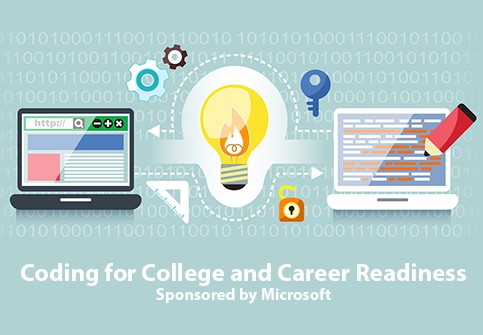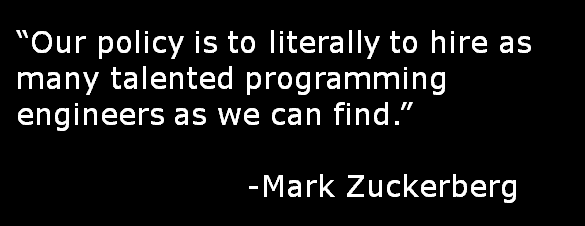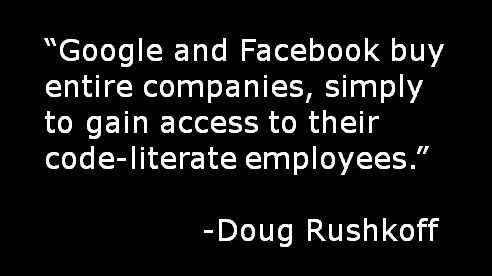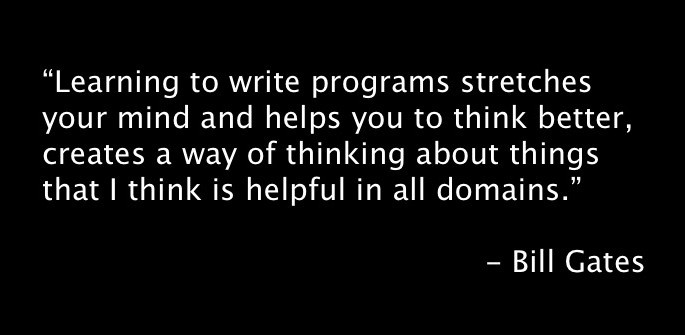The Transition from Cursive to Coding

My son missed a day of school last week, and when he returned, his teacher gave him directions for his makeup work that were written in cursive. He returned to that teacher later in the day, and this exchange took place:
Son: Mrs. Soandso, excuse me, I‘m sorry, but I can’t read your writing.
He gave the note back to her. She smirked at him with a disapproving look. (His words.) Another student who didn’t learn to read or write cursive. She then looked at the note and was a bit puzzled. Something was wrong. Finally…
Mrs. Soandso: Why didn’t you bring this to me sooner? I can’t remember what I wrote!
She couldn’t read it either! Cursive. Indecipherable, even to its own writer.
Its usefulness heated up in our house last week (because we don’t have real things to keep us up at night).
“It was difficult for doctors to give up leeches for modern medicine, but after the witch uprising was put down, it seemed like the right thing to do. We can shed cursive in the same manner.”
That is how I waded into the deep end of the Great Cursive Debate 2013 pool last week, but old-school English teachers and grammarians (“old” implied) on Reddit and other forums fought back with rather vicious attacks, mostly ad hominem in nature. I was called an English-language traitor and much worse. Their invective mudslinging language was right out of Star Wars (“wretched hive of scum and villainy”) and True Grit, the new one, not the old one (“You, sir, are the rodeo clown from Yell County!”). Thank you dictionary.com and urbandictionary.com for translating some of the insults for me. I was undaunted, though. They were empowered with righteousness. I had rightness on my side.
Their arguments to maintain cursive instruction in the grade school curriculum can be lumped into these airtight, data-driven arguments:
It’s tradition. (Logical fallacy in determining merit.)
I had to learn it. (What’s your position on Pluto as a planet?)
It let’s you write faster! (Myth.)
Heaven forbid we actually make students do something hard. (You’re just saying words now.)
It’s our signature. How will people know it’s really us? (You’re the reason we have captcha.)
It’s beautiful. (Really? Don’t confuse cursive with calligraphy.)
Meanwhile, in Estonia…
Students are learning to write code in first grade! Estonia, also known as “E-stonia”, is not just a technology driven country (that has given us Skype among other things), but also ranks above the U.S. in reading, math, and science scores. Parmy Olsen, of Forbes, writes, “The idea isn’t to start churning out app developers of the future, but people who have smarter relationships with technology, computers and the Web .”
If we’re looking for areas to replace outdated skills with 21st-century skills in the curriculum, this would be Ground Zero. Estonia’s first graders are learning the logic skills necessary for coding at the later grades. That’s uber practical for the 21st Century.

Reasons to Code
Coding is the most important language in the world right now. It’s the language that enables the machines and software that we use every day. Coding also opens the door up to entrepreneurial opportunities for anyone, regardless of their background. Many coders and those who advocate for teaching students how to code do so because learning to code does help equalize the playing field for all students, making coding a social justice issue. Finally, coding is a future-ready job skill for all disciplines.
Madeline McSherry of Slate says it best: “Coding is the hottest skill on the job market, the modern-day language of creativity, and a powerful force in the economy.”
Here are four reason why I believe students should be coding:
- Language Study: Coding is the most important language in the world right now. It’s the language that enables the machines and software that we use every day.
- Cross Discipline Benefits: This isn’t just about technology. All fields . . . art, music, exercise . . . have programming needs. If fact, it’s the ultimate creative outlet for the arts in digital media.
- Entrepreneurship: The list is long of self-made youth entrepreneurs on the internet. Coding opens that door wide open. There doesn’t have to be a gap between haves and have nots here.
- Future Ready: Coding is a future-ready job skill for all disciplines.
Ian Quillian of Mindshift identifies four other reasons to code:
- Subject Mastery – need it before you can code
- Systems Thinking – all in the inputs and outcomes of programming
- Collaboration – programming often done by a team
- Passion – students can take their programming skills into any field that they are passionate about

My own kids are both learning code through Code Academy. In less than a month, they have gone from having only basic awareness about coding to acquiring rather advanced skills (way over my head). We have a standing house rule for our kids: If they want to use anything that runs on code (computer, smartphone, gaming console), they have to complete at least one Code Academy lesson for the day. It’s never an issue, though. At. All. They are intrigued by coding and find it very cool in understanding how it works and in watching their own codes work. You know, those same feelings you get when you write in cursive.
During the height of my cursive writing debate last week, I asked my kids which was more important to learn, cursive writing or coding. They looked at me like this was some sort of trick question, like I had lost my mind. Like this was a grasshopper-snatch-the-pebble-from-my-hand-and-become-the-master test. Then they fell on the floor laughing.
“Seriously, Dad? You’re kidding, right?”
“Cursive is basically just a font, Dad!”
“Can we also learn how to write in Helvetica or Impact or Verdana or Windings?”
“We might need that one day!”
“Is BeDazzled a font?”
“Can we learn to write in BeDazzled?”
“Yeah, but only if we can use the BeDazzler!”
This blog is brought to you by Microsoft as part of a series on coding for college and career readiness. For more, stay tuned in January for the final published project, Getting Smart on Coding for College and Career Readiness and check out additional posts in the series:








Rick L
Cursive teaches fine motor skills; coding does not. One is not necessarily better than the other. The language of the body if you will is just as important as the language of the mind. To be successful, both are necessary—body and mind working together. In face-to-face communication between two people, most of the information is conveyed using non-verbal body language—a code in its own right. Interpersonal skills are also necessary for success and are greatly valued by companies. So, try coding in cursive using paper and pen—the best of both worlds ;-)
Elizabeth Brigham
Not being able to read cursive means not being able to read the majority of original documents written in the early 1900s or earlier. It means visiting Washington DC and not being able to read the Declaration. It means your parents pulling out the box of their grandparents' love letters, and you can't read them. By no longer teaching cursive, we as a society would be breaking a link with our past.